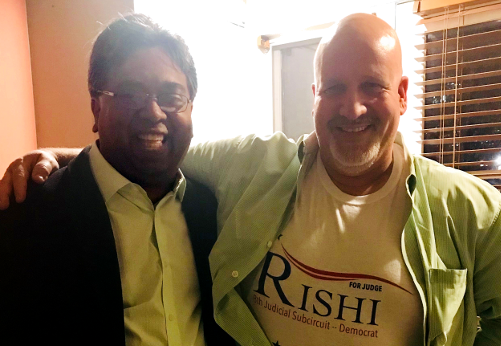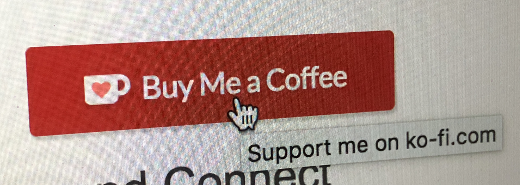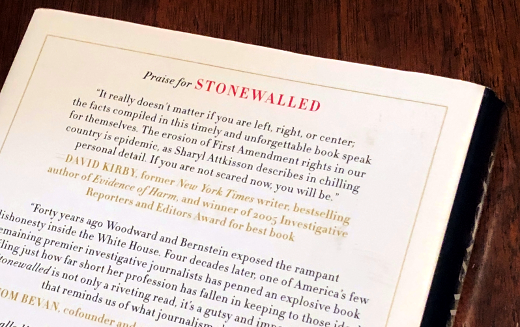3 Reasons To Vote For My Friend Rishi Agrawal For Cook County Judge
On Tuesday, March 20, please vote for my good friend, attorney Rishi Agrawal, for Cook County, Illinois Judge in the 8th Judicial Subcircuit.
When I say “my good friend” I mean it, as in I knew Rishi long before he decided to run for judge. As I thought about how to best share why I think he is the best candidate for the judgeship, rather than just say he is an awesome person (which he is!), 3 things came to mind which, after you read them, should lead you to punch number 163 on your ballot.
His passion for practicing law – Rishi and I were neighbors when I lived in Chicago, so as you would expect I would see him just about every day. When we would talk about our days, when he was going to or coming from court or meeting with clients, you could see the excitement in him. He loves litigation, being in court and giving the best representation for his clients. Where of course he wouldn’t give me specifics, he would talk with excitement of how he would prepare and go up against other lawyers or work to negotiate a settlement. Such a positive attitude, energy and regard for the law is something he will carry to the bench.
His ability to understand the big picture and how the law applies – Whenever you get a bunch of friends together casually and politics or current affairs come up, the conversation is certainly spirited. Often, people will come up with something that leans towards a legal opinion, even though most of us are not attorneys. In times like this, Rishi would take in the conversation, then join and acknowledge how people may be approaching an issue, then sharing how juris prudence may apply in a certain case. Not only did this help a conversation from getting outrageous, but it helped us all learn about the law and a point of view we may not have considered. This respect for the law is what Rishi will take to the courtroom when presiding over cases.
Giving back to his community – Whether it’s getting up early to coach his award-winning elementary school debate team before the school day starts, taking on pro bono clients or ones who had difficult cases that other attorneys would not touch, to his involvement in the local school council to local cultural and legal organizations, Rishi finds the time to give back, help his community as well as help to ensure people have access to quality legal representation. I admire his dedication and ability to multitask all of this with his own private law practice and family, and he stands as a model for others.
Voting for Judges Just as Important as all other Elected Offices
When you vote for judges in Cook County, they are usually at the end of the ballot, well after all other elected offices. However voting for judges is just as important as all other office, as you are sending someone to represent your best interests and those of the community at large, in this case to ensure fairness in the court system. Maybe you usually skip judges, or maybe you go fill out a ballot not knowing who any of them are. As I no longer live on Cook County, the biggest thing I and my family miss is our friends. This extends to not being able to vote for Rishi. Allow me to present a good friend and great individual that will make an even greater judge – Rishi Agrawal.
This is from The Hot Iron, a journal on business and technology by Mike Maddaloni.
Did you enjoy this? Subscribe to The Hot Iron by RSS/XML feed or Read by Email.
(0) Comments • Permalink
Buy Me A Coffee With Ko-fi To Support The Hot Iron
Over the past decade plus that I have been writing here at The Hot Iron, I have mentioned this is a labor of love, writing and sharing my thoughts with you reading it. For most of that same time I have explored options to make a little money from my endeavor, and I present my latest one with Ko-fi.
Buy Me a Coffee, Please
I came across Ko-fi a couple of times in the same day, which prompted me to check into it. It is a free service which allows you to post a button to your Web site or share a link to your personal Ko-fi page, where someone can choose to buy you a coffee, which is in essence giving you money. You can choose to follow others on Ko-fi or have them follow you. You can try all of this yourself by clicking the "Buy Me a Coffee" button on the right column of my blog (or click the photo in this post), or follow this link to my Ko-fi page.
In order for me to receive the money (presumably earmarked for a hot caffeinated beverage) I tie my PayPal account to it, and funds are deposited there. As a result it is a straight cash transaction, and no actual coffee is exchanged in the process, unless I move the money from my PayPal account.
But wait, could there be more?
Where in some regard it is not much different than putting a PayPal donation button or link on my blog, Ko-fi is a unique approach as it is not an ask for cash rather an offer for someone to buy me a beverage. The community around the profile page shows the extent to how folks have supported by coffee consumption, which is usually not far from my keyboard or notebook when I am writing.
Of course when I see something like Ko-fi, the entrepreneurial part of my brain is triggered, and there is great potential for this service. The idea of micropayments are not new, but this is a new, unique way of asking for them. A coffee company - hello, Starbucks or Peet's - could be a sponsor or even an owner of it and tie their current gift cards and mobile apps to Ko-fi, thus making the coffee purchase that much easier to the recipient.
As I mentioned, Ko-fi is in a long line of methods for asking for contributions from my readers. I have had Google AdSense ads on my blog for years, which over time has contributed some but has waned as display ads become almost invisible and blocked by Web browser plug-ins. CentUp was a short-lived service which required you to create an account both to give and receive. Google Contributor offered the ability to block ads from being displayed if you contributed money to a site, but it has been all but eliminated by the search giant. Ko-fi is free, but asks me to buy it coffee, which I have done out of support for it, and to ensure its developers are well-caffeinated when doing their part.
Deconstructing Earning Revenue for Blogging
As the early days of the Web were driven by the free distribution of content, later attempts to earn revenue for content have had a mix of success. Large newspapers and magazines have struggled with earning digital subscribers as their print subscriptions plummet. Attempts at paywalls are met with people finding ways to avoid them and get the content for free. Smaller publishers have also had the same mixed results, most positives coming from extreme niche content. These gaps have driven services like Ko-fi to find a different way to help publishers earn money. Where others have failed, it remains to be seen if a unique payment service could gain traction. If anything, small publishers like myself are certainly cautiously optimistic.
This is from The Hot Iron, a journal on business and technology by Mike Maddaloni.
Did you enjoy this? Subscribe to The Hot Iron by RSS/XML feed or Read by Email.
Blogging • Business • Social Media • Strategize • (0) Comments • Permalink
Penalizing Managers For Giving Bad Reviews As Afterthought
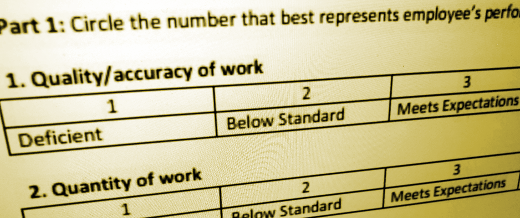
As the new year starts, for many it is also the start of the annual review process with their employer. Where this process varies from company to company, typically it entails creating goals for the coming year, taking into consideration the goals for the team, organization, group etc. and then at the end of the year measuring if you met those goals or not along with feedback that was accumulated throughout the year.
Ask any person who goes through this process and they will likely tell you they would rather spend time standing in line at the DMV! Many people feel it's a waste of time, not only in the fact that they have to spend time working on it but also at the end of the year a couple of things typically happen - one, they don't get a raise or a bonus, and two, for the first time they learn at the end of the year of something that happened months ago or even earlier in the year.
When you get written up on something in December that happened in March, how can you really do anything about it, nine months later, to affect any change? In other words, the performance appraisal process is broken, and I have an idea to fix it -penalize the manager that gives you a poor review or feedback at the end of the year as an afterthought when they had the opportunity to tell you earlier.
Say what?
If you think about it, at the end of the year when someone is giving you a review, their own personal review doesn't necessarily reflect yours. It should, for a manager should be measured on the overall performance of their team, as they should be ensuring their team is excelling at all times. Some manager do believe in this (including, fortunately, the manager I have now), however many managers don't want to be bothered by this throughout the year and as a result giving a poor performance review at the end of the year is really no skin off their teeth and comes naturally to them. Sometimes that poor performance review is based on asking others who have worked with you to provide their input, which is often referred to as a 360° review process. Even when organizations say they have a "immediate feedback mechanism" to let people know when they do well or when they do poorly, it rarely happens this way. Finding out about a problem at the end of the year when there's really nothing that can be done about it serves nobody well.
If the person giving the negative feedback is giving it too late, it is they themselves that should be marked down for it in the end of the year process. This gives the person giving the poor review skin in the game and makes them part of the solution. The whole idea is to inform people at the time something happens that something was unsatisfactory or could've been done better or could've been corrected. When it's given at that point, the person that has the opportunity to make the correction, discuss impacts on their workload that impacts their success, identify the need for education or training or greater organizational issues that need to be addressed that the manager may not even be aware of, et. al. The person and their manager or whomever is giving the negative feedback can then together put a plan in place to lead to success, along with a timeframe and measurement.
Been there, wish it was done
Many times throughout my career I have been on the receiving end of negative feedback too late to do anything about it. When I asked why nothing was brought up sooner, I was never given a definitive answer, namely as the review process did not require it. On the flipside, I have had many managers who gave me continuous feedback, comments, adjustments, etc. as I worked with them, and this was not only greatly appreciated but led to my success and the success of the project I was working on. I also hear this from friends and colleagues that hear of such late-in-the-game feedback they can do nothing about, which simply makes the workplace even less tolerable.
Deconstructing Giving Timely Feedback
Why not strike while the iron is hot, and give feedback while it is fresh, meaningful and can produce a positive outcome? This takes facing issues head-on, something many managers may not be comfortable with or other senior people don't want to be bothered with. By making these mid-game corrections, it allows everyone to succeed, and may also impact the bottom line of the team or organization. This investment in one's team is as important as any training or materials you spend money on them, and can reap even greater rewards.
This is from The Hot Iron, a journal on business and technology by Mike Maddaloni.
Did you enjoy this? Subscribe to The Hot Iron by RSS/XML feed or Read by Email.
Business • Strategize • Thrive • (0) Comments • Permalink
The Secret Life Of Old iPhones
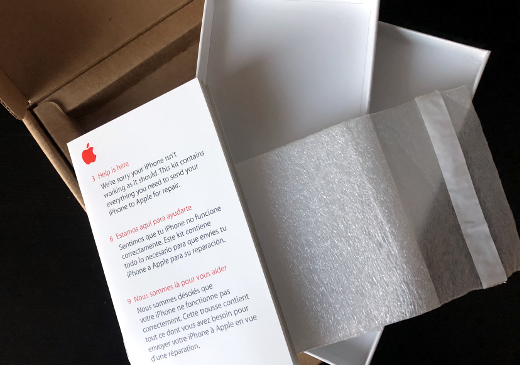
When the spotlight was shown on Apple’s “feature” to reduce the power of later model iPhones to compensate for degrading batteries without the owner’s knowledge, the tech giant’s remedy for this, accompanied by an apology, was to reduce the price they charge for a replacement battery from US$79 to US$29. A future upgrade to the iOS operating system will allow owners to disable this “feature” which should close the loop on this issue.
Like any action, there is always a reaction, or maybe 2 or several. In this case, Apple’s reputation has lost a little more of its luster, continuing what many have seen in a decline of their public perception since the death of founder Steve Jobs. No iPhone owner will be surprised if they receive an email or letter in coming months about a class-action lawsuit against Apple. I would add to this an observation I made when I was packaging up and sending in 2 iPhones for new batteries – a new life for otherwise “outdated” devices that may impact their future sales.
Reasons for Upgrade
Whether it’s a car, house, clothing or a smartphone, we all have reasons for upgrading to a newer model when available. On one end of the spectrum are more functional reasons, such as the “need” for new features – in the case of a smartphone, a faster processor or more memory. On the other end are reasons more for “form” or simply the desire to have the latest and greatest of whatever it is. Where I know people in the latter category, I know more that, especially with the rising cost of these devices, are sticking with older models.
Typically, these decisions were merely personal. With the lower battery cost, economics comes into play. By getting a new battery for around $30, you are in essence getting a new, older model smartphone. If you still want to upgrade to a new model, by making a small investment you can conceivably have a more valuable older model device, or one you can pass along to be used by someone else as if it were new.
As the ability to buy a used or new, older model device already exists, the aftermarket for iPhones will now expand with the opportunity for additional devices to be available in it. Or in my case, the demand for buying a new or additional devices has decreased with additional, well-suited devices, available to be reused for a lower cost.
Digital Hand-Me-Downs
Recently I got a new iPhone 8 mainly for the memory, as my iPhone 6’s paltry 16 GB was forcing me to delete apps just to take a few videos of a few minutes in length. And of course, the battery was spent to the point where I had to charge it several times a day, not to mention carrying a spare battery with me all the time. Despite these drawbacks of the 6, it was in great physical condition, and would be well suited for someone else to use.
Such a reuse is going to happen, as the device will be used by a family member who is upgrading from a flip-phone. I have sent it and paid the approximately $30 (I believe there was tax on top of it), once I get the phone back I will set it up for this family member as their more-than-perfect entry into the world of smartphones. Other older models of iPhones are already in use in my family, as my kids use them as WiFi devices and without a SIM card, after I followed what I shared before on how to best setup an iPhone for this purpose.
With the number of iPhones sold over time, there’s a demand for the new batteries. I personally ordered and sent in 2 iPhones, a 6 and a 6S, as I no longer live within walking distance of an Apple Store. Where I sent in the 6 before the 6S, the 6S came back within 3 days. Looking into it, there is a shortage of 6 and 6+ batteries. Apple’s Web site gives me no indication my replacement is pending for this reason though. Once again, a spotlight is being shone on Apple that they have to react to.
Deconstructing a New Life for old iPhones
How will this new life for these iPhones impact the market for new ones from Apple? It’s hard to say exactly. Technology today is made to be disposable, as repair costs will typically cost more than buying a new item. However, with the cost of the new iPhone X at US$999 or even the new iPhone 8 at US$699, paying thirty bucks for a new battery is almost a no-brainer, whether you personally need the device or are looking to sell or hand it off to someone else.
This is from The Hot Iron, a journal on business and technology by Mike Maddaloni.
Did you enjoy this? Subscribe to The Hot Iron by RSS/XML feed or Read by Email.
Mobile Technology • Strategize • Technology • (2) Comments • Permalink
My Takeaways From The Book Stonewalled
You don't need me to tell you that today the news media is as much about the story as what they are covering. If you're like me you'd rather not hear about reporters and networks being the top story, rather what's actually going on in the world. Where we may hear a digested, front-end view of their involvement in the story, rarely do we get an insider's view of what's really going on behind the sense in newsrooms or how someone is being impacted, especially when they're being impacted negatively.
As someone who doesn't have cable TV or an antenna and haven't for a very long time I almost never watch the network news or major cable news networks. Instead my news comes from online, reading news Web sites, subscribe to their RSS feeds and following their Twitter accounts. In addition to this, I follow many individual reporters, reading not only what they are posting as new stories but their own Twitter timelines. Where this aggregation of information of information is probably more comprehensive and time consuming than simply “watching the news,”, but it allows me to come to my own informed consensus of what’s going on.
Among the reporters I follow is Sharyl Attkisson, a national investigative reporter who is the host of Full Measure and author of the book The Smear which I recently read and shared my takeaways from. As I have been following her and her reporting for several years, I was drawn to read her most recent book, as well as her first book, Stonewalled: My Fight for Truth Against the Forces of Obstruction, Intimidation, and Harassment in Obama's Washington, where she chronicles covering news events in Washington, and believed political forces worked against her, even hacking into her computers.
Though I read Stonewalled before I read The Smear, I still recall well the takeaways and questions I had from this book.
The “making of the sausage” that is network news – If you think about it, there is very little network news available to be watched. A 30-minute newscast is really only 23 minutes of programming and 7 minutes of commercials. In this time only so many stories can be covered and only to a certain depth. This is also costly in reporter-power plus research. Even the 27/7 news channels don’t cover all that much news as compared to opinion programming.
In Stonewalled, Attkisson states that this plays into whether stories are aired or not. As well, it can be up to the news anchor themselves what gets aired. If that person has a bias, stories may never get seen by the viewing public. She details many cases of this during her years at CBS News.
Overflow news stories on the Web – When some of Attkisson’s news reports were not aired on the evening news program, they were often posted to CBS News’ Web site. I personally had no idea this happened; my assumption was that stories on the Web site were simply what aired. As a result, I have added news Web sites to the mix of news sources I mentioned above to gather all points of view, think for myself and form my own opinion on events around the corner and around the world.
Did the government really hack into her computers? As of this writing and for over 10 years, Attkisson has been trying to get information from the government on what she suspects and was confirmed by her informants, that employees of an unknown part of the US government hacked into her personal and work computers. Why? She suspects her persistent coverage of the Fast and Furious scandal and other government investigative reporting may have led to this. And to date, she has yet to get any official answers.
Stonewalled is a well-written journey through the life in the US capital area, complete with shadowy figures as well as those operating in broad daylight. I highly recommend it as a compliment to what was observed in the news over the last decade. As I finished reading this a while ago, I also promised it to someone a long time ago, and finally the book is in the mail.
This is from The Hot Iron, a journal on business and technology by Mike Maddaloni.
Did you enjoy this? Subscribe to The Hot Iron by RSS/XML feed or Read by Email.
Book Take-Aways • (0) Comments • Permalink

